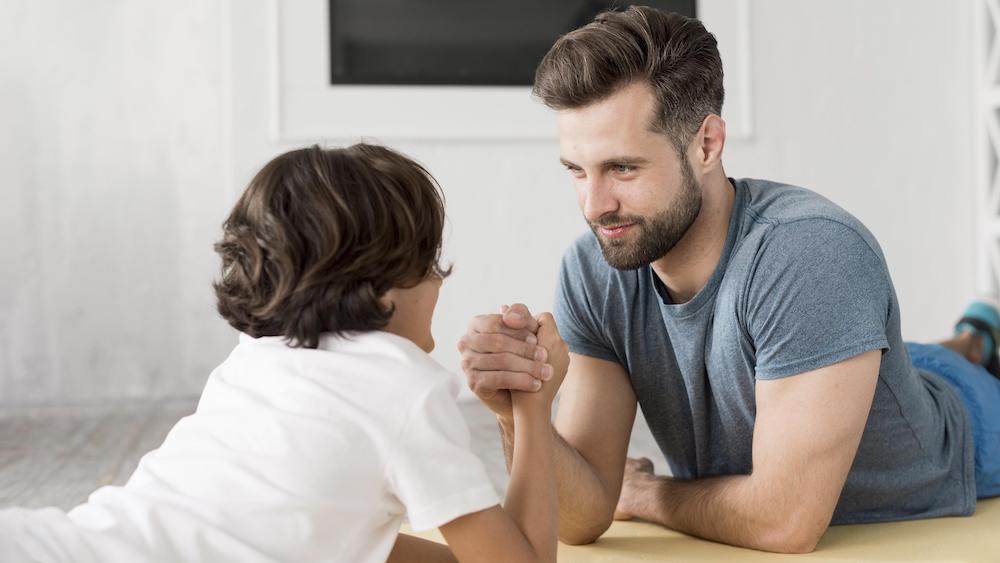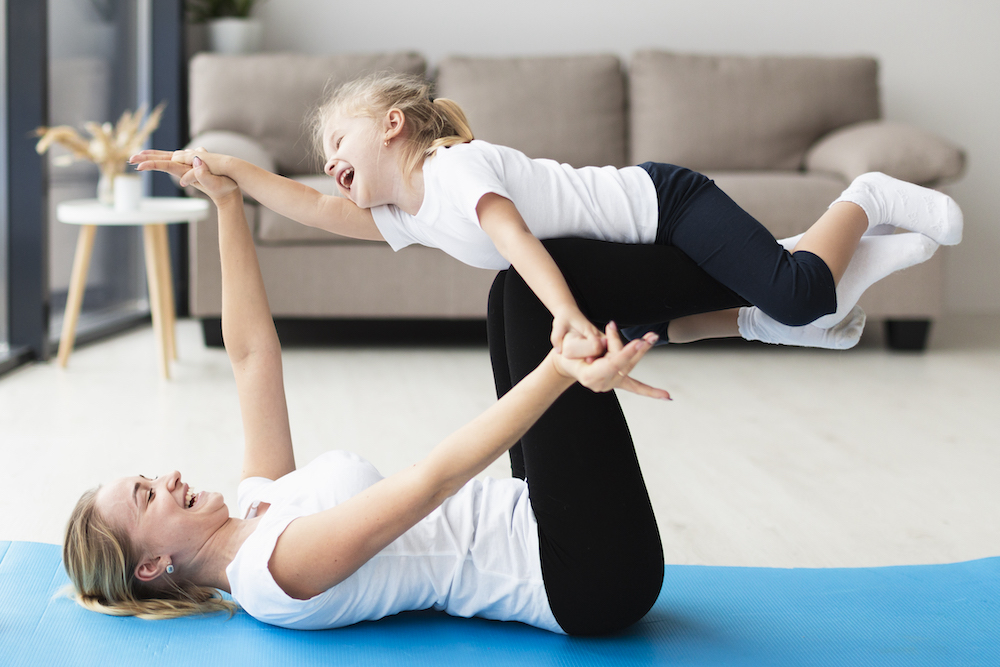Ever wondered about the secret sauce to raising a happy, well-adjusted kid? It’s tempting to think it’s all about the endless extracurriculars or the newest gadgets. And while those things are fine, the real magic lies with you, the parent. When parents actively engage – physically, emotionally, and mentally – it makes a real difference in a child’s happiness and overall well-being. Let’s explore how being present and involved can shape your child’s emotional, social, and even academic life, setting them up for a brighter future.
To help you get started incorporating fitness into your active parenting routine, consider investing in some quality home workout equipment. Even something as simple as Southside Fitness’s hex dumbells can provide opportunities for you and your kids to exercise together, turning fitness into a fun family activity that promotes both physical and emotional well-being. After all, happy and healthy parents build happy and healthy families!

Okay, But What Does “Active Parenting” Actually Mean?
So, what is “active parenting,” really? It’s more than just physically being there. You know, you can be in the same room as your child, scrolling through your phone, or you can be really with them – listening to their stories, playing a game, or even helping (or trying to help!) with homework. Active parenting means emotional engagement, a real interest in their education, getting physical, and keeping the lines of communication wide open. Of course, what this looks like changes depending on culture, background, and even your own upbringing. It’s not a one-size-fits-all thing.
Think of it like a spectrum. On one side, you’ve got parents who, for all sorts of reasons, might struggle to really connect. On the other, you see parents completely immersed in their children’s lives. And somewhere in the middle is that sweet spot: active parenting. It’s about finding a balance between being there, supporting their dreams, and encouraging them to be independent. It isn’t always easy.
PrairieCare points out that active parenting fosters emotional security and resilience in kids. What we do truly matters. Parenting style really does have a massive influence on how a child develops.
The Science of Happy Kids
Why does being an active parent lead to happier kids? The science is actually pretty clear. For example, the Harvard Grant Study, which has been tracking human development for decades, keeps pointing to the importance of strong relationships for overall well-being. We’re talking about children who feel loved, supported, and really understood. These kids are more likely to develop emotional security, a healthy sense of self-esteem, and a sense of control over their own lives. Which, I mean, just makes sense, right?
The American Academy of Pediatrics also emphasizes how important play is for social and emotional development. Active parenting fosters those crucial things by creating space for connection, communication, and plain old fun. One study, for instance, found that children who regularly played with their parents had lower levels of anxiety.
It’s not just a feel-good idea; it’s backed by solid research. Studies have shown that when parents are actively involved, it can really improve a child’s mental health. Kids feel seen, heard, and valued. This boosts their happiness and overall well-being.
Emotional Availability: The Real Core
I’d argue that emotional availability is the most important part of being an active parent. It’s about really being present – physically and emotionally – and being open to what your child needs. It’s creating a safe space where they feel like they can share their thoughts and feelings without being judged. Isn’t that what we all really want for our kids?
When you consistently show that you value your child’s emotions, you’re helping them learn how to cope with stress, build resilience, and feel secure. Active listening, showing empathy, and keeping the lines of communication open are absolutely key. Put down your phone, make eye contact, and really listen. You might be surprised at how much of a difference even a little bit of focused attention can make.
One simple thing to try is the “10-Minute Rule.” Set aside ten minutes each day where your child has your undivided attention. Let them choose what you do – play a game, read a book, or just chat about their day. Those small moments can have a big impact.
Don’t Underestimate Play and Physical Activity
Play is so underrated! And I’m not just talking about structured sports; I mean free play, the kind where kids get to use their imaginations. It’s not just about burning energy; it’s about building bonds, dealing with stress, and learning social skills. Parents who are physically active with their kids – whether it’s hiking, playing sports, or having a spontaneous dance party – strengthen those all-important emotional connections.
Turns out, physical interaction also helps kids develop healthy habits and learn to regulate their emotions. Roughhousing, for example, can actually be a great way for kids to release pent-up energy and develop self-control. So, get out there and play! A quick walk with the kids can make a world of difference.
According to a clinical report by the AAP, engaging in play supports social-emotional, cognitive, and self-regulation skills. Active parenting, combined with play, sets kids up for healthy habits and emotional regulation.

Active Parenting in a World That Never Stops
Let’s be real: Life is busy. Between dual-income households, the constant distractions of technology, and long commutes, it can be tough to be an active parent. It’s easy to feel drained and disconnected when you’re juggling work, family, and trying to carve out a little “me” time. But even with a packed schedule, it is possible to make time for quality connections. You just have to prioritize it.
Here are a few practical ideas:
- Schedule it: Treat connection time like you would any other important meeting. Put it on the calendar and stick to it.
- Make the most of small moments: Even if it’s just 15 minutes while you’re making dinner, that undivided attention can build trust and self-worth.
- Unplug: Designate times when everyone puts away their devices and focuses on each other. Maybe it’s during dinner, or for an hour before bedtime.
Remember, even small, consistent efforts can make a real difference. It’s not about being perfect; it’s about showing up.
The Ripple Effect: Long-Term Impacts
Active parenting is an investment in your child’s future. A number of longitudinal studies show a strong link between parental involvement and future academic success, emotional intelligence, and a lower risk of depression. Kids who grow up with actively involved parents are more likely to have healthy relationships, achieve their goals, and, ultimately, lead fulfilling lives.
Strong parent-child bonds contribute to lasting trust and can reduce teenage rebellion. When kids feel connected to their parents, they’re more likely to ask for help and support when they’re facing challenges. The difference between kids who grow up with passive parenting versus active parenting is pretty stark over time. Those raised in actively involved families tend to be more resilient, confident, and well-adjusted.
Research abstracts show that active parenting improves family functioning and parent-child relationships, which leads to happier kids.
Simple Steps to Becoming a More Active Parent
So, how do you become a more active parent? Here are a few ideas to get you started:
- Have daily check-ins: Ask your child about their day, how they’re feeling, and if anything is bothering them.
- Involve them in household tasks: Teaching responsibility builds connection and gives them a sense of accomplishment.
- Read together regularly: Reading aloud fosters a love of learning and creates opportunities for connection.
- Set up tech-free zones: Designate times when everyone puts away their devices and focuses on each other.
- Plan goals or weekend plans together: Involving your child in decision-making fosters a sense of control and belonging.
- Tell them you love them. Every. Single. Day. And tell them they are good people.
Don’t try to overhaul everything at once. Start with one or two things, be consistent, and celebrate the small wins.
The Takeaway? Presence Over Perfection
Active parenting isn’t about being the perfect parent; it’s about being present. It’s about showing up, being engaged, and building a strong, loving connection with your child. And when parents do that consistently, children don’t just survive, they truly thrive. By prioritizing active parental involvement, you’re giving your child a foundation for a lifetime of happiness, success, and well-being. So, embrace the journey! It’s a rewarding one.









